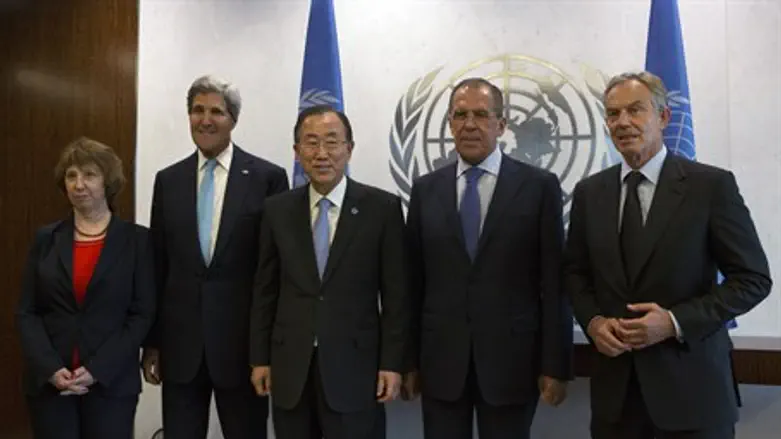
The foreign ministers of the Quartet - the United States, Russia, EU and UN - decided on Friday at the end of their meetings on the sidelines at a security conference in Munich to formulate a “report” on the situation in Judea and Samaria, according to Haaretz.
The report will include recommendations for measures to end the escalation of violence and promote a two-state solution, said the statement distributed at the end of the meeting.
"The Quartet reaffirms its commitment to act in coordination with key stakeholders, including regional countries and the UN Security Council, to stabilize the situation and to actively support a just, comprehensive and lasting settlement of the Palestinian-Israeli conflict," read the statement quoted by the newspaper.
"In that regard, the Quartet will prepare a report on the situation on the ground, including recommendations that can help inform international discussions on the best way to advance the two-state solution," it added.
The Quartet was set up in 2002 to promote what is known as the Middle East peace process.
In 2011 the group suggested a timetable which it said would bring forth a peace agreement by the end of 2012, one of several initiatives proposed by the Quartet which have failed.
In recent months the Quartet has attempted to resume the stalled talks, but several months ago cancelled a trip to the region at Prime Minister Binyamin Netanyahu’s request.
It was not entirely clear from Friday’s announcement if the report will present recommendations for practical actions or whether it will also include policy recommendations on principles for resolving the conflict or the resumption of peace talks, noted Haaretz.
The fact that the statement referred to the activities of the UN Security Council raises the possibility that the announcement was in preparation for a broader international political move.
Members of the Quartet expressed their concern regarding trends on the ground, including violence directed at civilians, Israeli construction in Judea and Samaria and the demolition of Palestinian houses, all of which “are dangerously imperiling the viability of a two-state solution.”
In their announcement, they stated that unilateral steps by Israel or the Palestinians cannot predetermine the results of negotiations.
The foreign ministers of the quartet further emphasized that the status quo cannot continue and that there is an urgent need to take steps that will concord with a process of transition to a “two-state reality”.
“The continued absence of such steps was leading to further deterioration, to the detriment of both Israelis and Palestinians,” the statement said, calling on both sides to “swiftly demonstrate” a genuine commitment to a two-state solution in order to rebuild trust and avoid a cycle of escalation.
The statement came as Israel and the EU ended a freeze on mutual talks regarding the Israeli-Palestinian conflict, which was imposed by Israel after the EU passed a decision to label products from Judea, Samaria and the Golan Heights as “settlement products”.
Peace talks between Israel and the Palestinian Authority (PA) stalled in 2014 when the PA breached the condition of the talks and unilaterally joined international institutions.
(Arutz Sheva’s North American desk is keeping you updated until the start of Shabbat in New York. The time posted automatically on all Arutz Sheva articles, however, is Israeli time.)